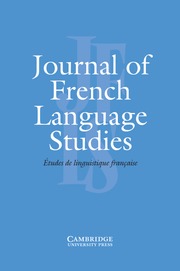Crossref Citations
This article has been cited by the following publications. This list is generated based on data provided by
Crossref.
Bürki, Audrey
Ernestus, Mirjam
and
Frauenfelder, Ulrich H.
2010.
Is there only one “fenêtre” in the production lexicon? On-line evidence on the nature of phonological representations of pronunciation variants for French schwa words.
Journal of Memory and Language,
Vol. 62,
Issue. 4,
p.
421.
Kaplan, Aaron
2011.
Variation through markedness suppression.
Phonology,
Vol. 28,
Issue. 3,
p.
331.
Bürki, Audrey
Ernestus, Mirjam
Gendrot, Cédric
Fougeron, Cécile
and
Frauenfelder, Ulrich Hans
2011.
What affects the presence versus absence of schwa and its duration: A corpus analysis of French connected speech.
The Journal of the Acoustical Society of America,
Vol. 130,
Issue. 6,
p.
3980.
2011.
The Handbook of Phonological Theory.
p.
779.
Kimper, Wendell A.
2011.
Locality and globality in phonological variation.
Natural Language & Linguistic Theory,
Vol. 29,
Issue. 2,
p.
423.
Bürki, Audrey
Fougeron, Cécile
Gendrot, Cedric
and
Frauenfelder, Ulrich H.
2011.
Phonetic reduction versus phonological deletion of French schwa: Some methodological issues.
Journal of Phonetics,
Vol. 39,
Issue. 3,
p.
279.
Torreira, Francisco
and
Ernestus, Mirjam
2011.
Vowel elision in casual French: The case of vowel /e/ in the word c’était.
Journal of Phonetics,
Vol. 39,
Issue. 1,
p.
50.
Bürki, Audrey
Alario, F. Xavier
and
Frauenfelder, Ulrich H.
2011.
Lexical representation of phonological variants: Evidence from pseudohomophone effects in different regiolects.
Journal of Memory and Language,
Vol. 64,
Issue. 4,
p.
424.
Lacheret, Anne
Lyche, Chantal
and
Tchobanov, Atanas
2011.
Schwa et position initiale revisités : l'éclairage de la prosodie en phonologie du français contemporain.
Langue française,
Vol. n°169,
Issue. 1,
p.
137.
2012.
Études de linguistique gallo-romane.
p.
357.
Bürki, Audrey
and
Frauenfelder, Ulrich H.
2012.
Producing and recognizing words with two pronunciation variants: Evidence from novel schwa words.
Quarterly Journal of Experimental Psychology,
Vol. 65,
Issue. 4,
p.
796.
Bürki, Audrey
Spinelli, Elsa
and
Gareth Gaskell, M.
2012.
A written word is worth a thousand spoken words: The influence of spelling on spoken-word production.
Journal of Memory and Language,
Vol. 67,
Issue. 4,
p.
449.
EYCHENNE, JULIEN
2014.
Schwa and theloi de positionin Southern French.
Journal of French Language Studies,
Vol. 24,
Issue. 2,
p.
223.
Lambert, Eric
Sausset, Solen
and
Rigalleau, François
2015.
The ortho-syllable as a processing unit in handwriting: the mute e effect.
Reading and Writing,
Vol. 28,
Issue. 5,
p.
683.
Maïonchi-Pino, Norbert
Taki, Yasuyuki
Magnan, Annie
Yokoyama, Satoru
Écalle, Jean
Takahashi, Kei
Hashizume, Hiroshi
and
Kawashima, Ryuta
2015.
Sonority-related markedness drives the misperception of unattested onset clusters in French listeners.
L’Année psychologique,
Vol. 115,
Issue. 02,
p.
197.
Maïonchi-Pino, Norbert
Taki, Yasuyuki
Magnan, Annie
Yokoyama, Satoru
Écalle, Jean
Takahashi, Kei
Hashizume, Hiroshi
and
Kawashima, Ryuta
2015.
Sonority-related markedness drives the misperception of unattested onset clusters in French listeners.
L’Année psychologique,
Vol. Vol. 115,
Issue. 2,
p.
197.
Arnold, Jennifer E.
and
Watson, Duane G.
2015.
Synthesising meaning and processing approaches to prosody: performance matters.
Language, Cognition and Neuroscience,
Vol. 30,
Issue. 1-2,
p.
88.
Andreassen, Helene N.
2015.
Acquisition du schwa en français (suisse) : pourquoi une combinaison de méthodes est-elle nécessaire pour assurer des données fiables ?.
Lidil,
p.
119.
Eunmee Park
2016.
Caractéristiques phonologiques dans le sud de France.
ASSOCIATION CULTURELLE FRANC0-COREENNE,
Vol. null,
Issue. 33,
p.
1.
Bayles, Andrew
Kaplan, Aaron
and
Kaplan, Abby
2016.
Inter- and intra-speaker variation in French schwa.
Glossa: a journal of general linguistics,
Vol. 1,
Issue. 1,


